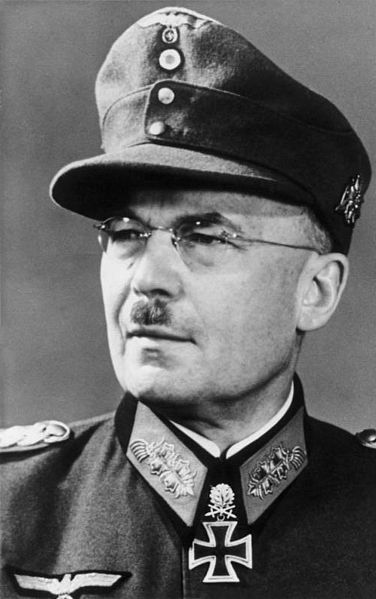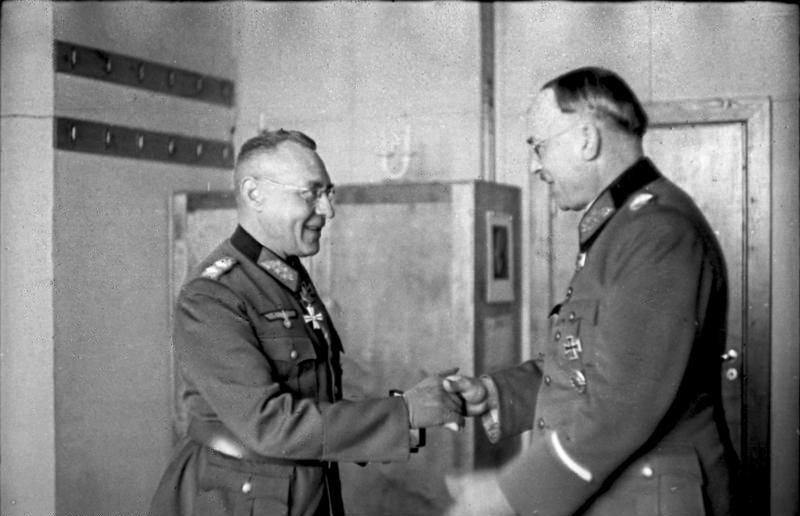<Back to Index>
- General of the German Army Lothar Rendulic, 1887
PAGE SPONSOR


Generaloberst Lothar Rendulic (23 November 1887 – 18 January 1971) was an Austro - Hungarian and Austrian Army officer of Croatian origin who served as a German general during World War II. He commanded the 14. Infanterie - Division, 52. Infanterie - Division, XXXV Armeekorps, 2. Panzer - Armee, 20. Gebirgs - Armee, Heeresgruppe Kurland, Heeresgruppe Süd, Heeresgruppe Nord and the Heeresgruppe Ostmark. He was also a recipient of the Knight's Cross with Oak Leaves and Swords.
Rendulic was born in Wiener Neustadt, Austria, to a Croatian family (the Croatian spelling of the surname is Rendulić). His father Lukas was a colonel in the Austro - Hungarian army. Following his Abitur, Lothar studied law and political science at universities in Vienna and Lausanne; in 1907, he was admitted to the Theresianische Militärakademie (later renamed the Kriegsschule Wiener Neustadt) in his home town, Wiener Neustadt. In August 1910, Rendulic was commissioned a lieutenant in the Austro - Hungarian Army and assigned to the 99. Infanterieregiment Georg I., König der Hellenen, in Vienna. He remained with this regiment during the first year of World War I before being posted to the 31.Infanterie - Division in 1915 and to XXI. Korps in 1918.
Following the war, Rendulic studied law at the University of Vienna and in 1920 was awarded his doctorate in law (a Dr. iur. in German). He also joined the newly formed army of the Austrian republic and in 1932 joined the banned Austrian Nazi Party. From 1934, Rendulic served in the diplomatic corps as a military attaché for France and England with an office in Paris. However, his promising military and diplomatic career faltered in 1936, when he was put on the temporary inactive list because his early membership in the Nazi Party was considered undesirable for an Austrian officer and diplomat.
Rendulic was called to the German Army, the Wehrmacht, in 1938, after the annexation of Austria to Germany. By 1940, Rendulic was serving as the acting general officer in command of the 14. Infanterie - Division (23.6.40 - 10.10.40). From 1940 to 1942, he was the general commanding the 52nd Division. From 1942 to 1943, he was the general in command of the XXXV Corps. But, by 1943, Lothar Rendulic was being held in reserve.
From 1943 to 1944, Rendulic served as the general commanding the 2nd Panzer Army in Yugoslavia. Early in 1944, the Führer Adolf Hitler ordered Rendulic to devise a plan to capture Yugoslav partisan leader Josip Broz Tito. In the resultant raid on Drvar on 25 May 1944, German paratroopers stormed partisan headquarters in Drvar (western Bosnia) looking for Tito and very nearly captured him.
Following the death of General Dietl in June 1944, Rendulic served as the general commanding the 20th Mountain Army as well as the commander of German troops stationed in Finland and Norway. It is oft-stated that Rendulic in October 1944 ordered the Finnish town of Rovaniemi to be burned in revenge against the Finns for having concluded a separate peace with the Soviet Union. Rendulic actually ordered Rovaniemi’s public buildings destroyed while Finnish private property was to be spared. While the German rear guard was going about the destruction, an ammunition train in Rovaniemi station exploded and set fire to the wooden houses of the town. The German troops suffered many casualties, mainly from glass splinters. Ironically, a Finnish commando unit claimed to have blown up the ammunition train and may well have been the primary cause of the town's ruin. The cause was then unknown and generally assumed to be the deliberate intent of Rendulic.
In 1945, Rendulic served as the commander - in - chief of Heeresgruppe Kurland (Army Group Courland) on the Eastern Front. By this time, the Army Group was completely cut off in the Courland Pocket. Shortly thereafter, Rendulic served briefly as commander - in - chief of Heeresgruppe Nord (Army Group North, then located in northern Germany), returned to commanding Army Group Courland (fighting in what was left of Latvia), and finally commanded Heeresgruppe Sud (Army Group South, soon renamed Heeresgruppe Ostmark, in Austria and Czechoslovakia).
On 7 May 1945, during the Prague Offensive, Lothar Rendulic, its commander - in - chief, surrendered Army Group Ostmark to the elements of the U.S. Army in Austria.
After his surrender, Lothar Rendulic was interned and tried as a military criminal in the "hostages trial" at Nuremberg, because of his involvement in the Wehrmacht's attacks on civilians in Yugoslavia and the scorched earth policy in Lapland. On 19 February 1948 he was found guilty and sentenced to twenty years in prison, although he was cleared of charges concerning the scorching of Lapland. This sentence was later reduced to ten years, and on 1 February 1951 Rendulic was released from the military prison in Landsberg am Lech in Bavaria.
After his release, the Generaloberst worked as an author and was involved in local politics in Seewalchen am Attersee, in the Salzkammergut region of Austria. He died at Eferding, Austria, on 18 January 1971.
On 4 September 1916 Rendulic married Nella Zöbl.